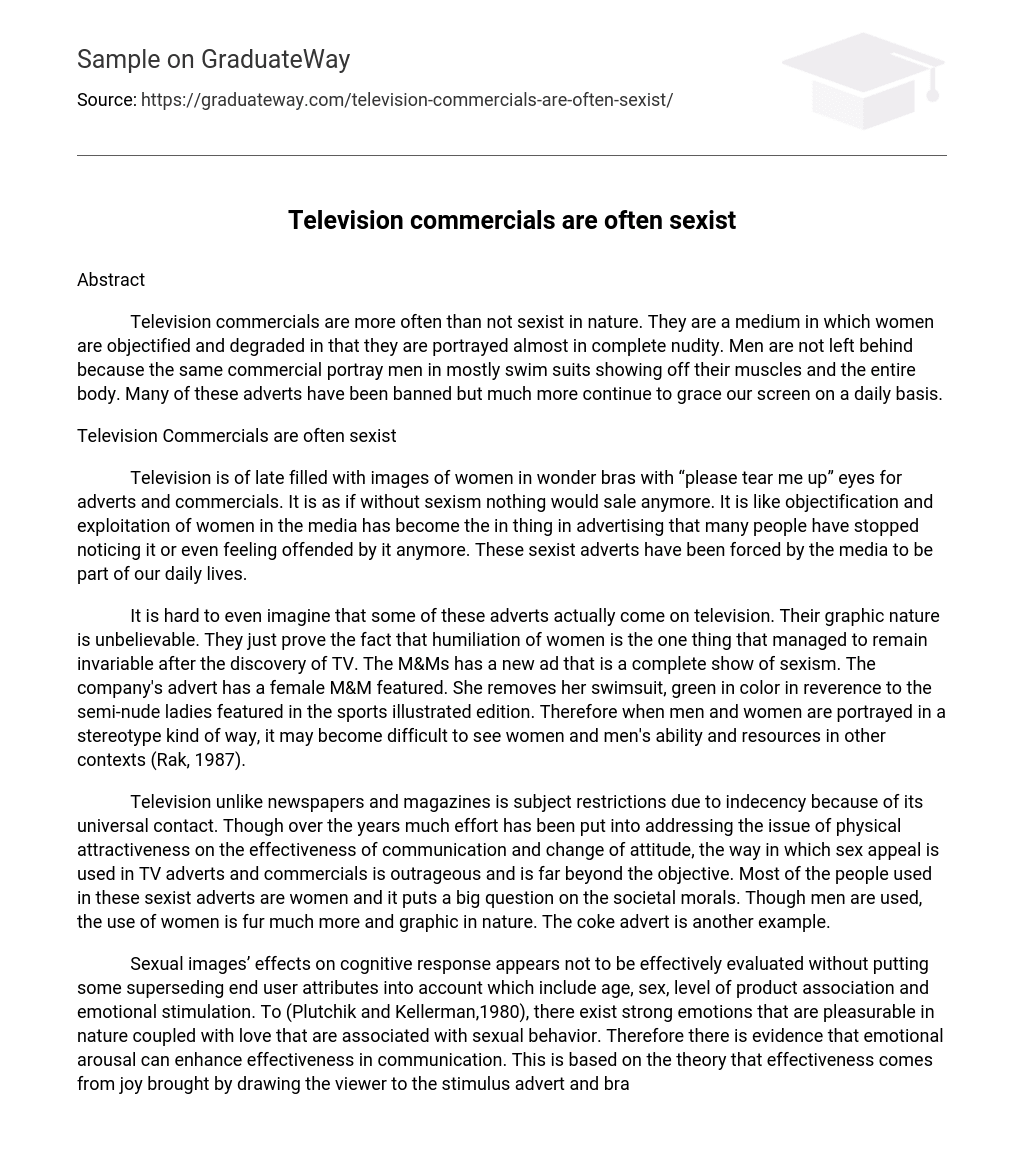Abstract
Television commercials are more often than not sexist in nature. They are a medium in which women are objectified and degraded in that they are portrayed almost in complete nudity. Men are not left behind because the same commercial portray men in mostly swim suits showing off their muscles and the entire body. Many of these adverts have been banned but much more continue to grace our screen on a daily basis.
Television Commercials are often sexist
Television is of late filled with images of women in wonder bras with “please tear me up” eyes for adverts and commercials. It is as if without sexism nothing would sale anymore. It is like objectification and exploitation of women in the media has become the in thing in advertising that many people have stopped noticing it or even feeling offended by it anymore. These sexist adverts have been forced by the media to be part of our daily lives.
It is hard to even imagine that some of these adverts actually come on television. Their graphic nature is unbelievable. They just prove the fact that humiliation of women is the one thing that managed to remain invariable after the discovery of TV. The M&Ms has a new ad that is a complete show of sexism. The company’s advert has a female M&M featured. She removes her swimsuit, green in color in reverence to the semi-nude ladies featured in the sports illustrated edition. Therefore when men and women are portrayed in a stereotype kind of way, it may become difficult to see women and men’s ability and resources in other contexts (Rak, 1987).
Television unlike newspapers and magazines is subject restrictions due to indecency because of its universal contact. Though over the years much effort has been put into addressing the issue of physical attractiveness on the effectiveness of communication and change of attitude, the way in which sex appeal is used in TV adverts and commercials is outrageous and is far beyond the objective. Most of the people used in these sexist adverts are women and it puts a big question on the societal morals. Though men are used, the use of women is fur much more and graphic in nature. The coke advert is another example.
Sexual images’ effects on cognitive response appears not to be effectively evaluated without putting some superseding end user attributes into account which include age, sex, level of product association and emotional stimulation. To (Plutchik and Kellerman,1980), there exist strong emotions that are pleasurable in nature coupled with love that are associated with sexual behavior. Therefore there is evidence that emotional arousal can enhance effectiveness in communication. This is based on the theory that effectiveness comes from joy brought by drawing the viewer to the stimulus advert and brand causing acceptance hence selling.
Even with these hypothetical assumptions, the power of bodily beauty on communication and the impact physically attractive models have on the purchasing power of products is still not substantiated. Though nakedness and erotic contents have been found to increase the attention of consumers to an ad, they do not necessarily increase the number of sales recorded on that particular brand. Research evidence shows that, as the intensity of nudity increase, the original intended communication effects turn negative and the whole focus turns to the erotic nature of the advert (Rak, 1987).
Women still have an extensive way to go in terms of commercial more so where beer adverts are concerned. The company does not force the women who appear in these adverts almost naked to be there. If every woman stood her ground and objected being used as a sex symbol in an advert, wouldn’t these companies change their form and kind of adverts? It starts with an individual. Feminists who lobby for the banning of these sexist adverts know that those who have control of the media do control the flow of information and perception power. The way the media manipulates women’s sexuality serves as an attestation that women do not have total possession of their bodies in any field. Unless women as individuals take control, these adverts that degrade women are here to stay.
References
Plutchik, R.,& Kellerman, K. (1980). Emotion, theory and experiences. New York: Academic Press.
Rak, D., & McMullen, L. M. (1987). Sex-role stereotyping in television commercials: A verbal response mode and content analysis. Canadian Journal of Behavioral Science, 19, 25-39.





